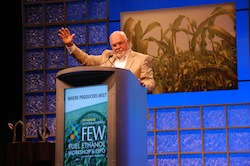 The USDA is making available up to $98.6 million to support the production of advanced biofuels. This news release from the agency says it will be an opportunity for eligible producers to submit applications and strengthen the rural economy:
The USDA is making available up to $98.6 million to support the production of advanced biofuels. This news release from the agency says it will be an opportunity for eligible producers to submit applications and strengthen the rural economy:
“The United States is on the path to a cleaner, more secure energy future,” [Agriculture Secretary Tom] Vilsack said. “By helping producers to support and expand the production of advanced biofuels, USDA is ensuring that Rural America is a key component of President Obama’s ‘all-of-the-above’ energy strategy to reduce the Nation’s reliance on foreign oil.”
The payments are provided through USDA Rural Development’s Bioenergy Program for Advanced Biofuels, commonly referred to as the Advanced Biofuel Payment Program. It was established in the 2008 Farm Bill to support the expansion of advanced biofuel production. Payments are made to eligible producers based on the amount of biofuel produced from renewable biomass, other than corn kernel starch. Examples of eligible feedstocks include crop residue; animal, food and yard waste; vegetable oils; and animal fat.
Producers use the payments to offset production costs and in some instances expand their operations. For example, in 2012, Sequential-Pacific Biodiesel, a biodiesel facility based in Salem, Ore., increased its annual production by approximately 1 million gallons, or about 20 percent. Sequential-Pacific primarily uses locally sourced waste vegetable oils in its production of biodiesel. The support USDA Rural Development provided through its Bioenergy Program for Advanced Biofuels helped the company buy equipment that increased the speed of production and pre-treatment of feedstock.
If producers didn’t apply for payments during the October 2012 application window, they may now apply for these payments for third and fourth quarter fiscal year 2013 production as well as for any applicable incremental production. Applications must be in by July 11, 2013. More information is available here on the Federal Register.
Since 2009, more than 275 eligible producers in 44 states have received payments.








